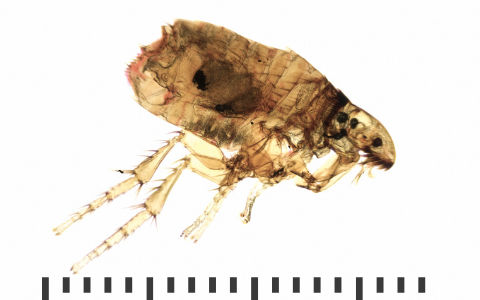No Products in the Cart
How Often Should I Treat my Dog for Fleas?

As veterinarians, that's probably the question we hear the most often! But, of course, there is a good reason why this is the most frequently asked question! Indeed, fleas are the most common parasites and are highly annoying to handle. If you've already dealt with them, you will probably agree that they are a pest!
We agree that you don't want them anywhere near your dog or house and family! But how to be sure your dog doesn't get fleas?
Also Read: Is Your Dog Prone to Elbow Dysplasia? Symptoms and Best Treatments
Can fleas survive in the winter?
One urban legend is that fleas disappear during winter. That's not accurate!
What happens during winter is a slower life cycle ( from an adult to another adult). Indeed fleas' development is correlated with temperatures:
- When the temperature is at 80°F, they will complete their entire cycle in about 15 days.
- At 66°F, they need 30 days to execute their cycle.
- At 50°F, they can't go through their process anymore, but they can survive 30 weeks in a resistant, intermediate stage called the pupa.
So, although their development slows down drastically during winter, fleas are very well alive and protected by the cocoon of the pupa stage.
As a result, they can survive months without food, water, and low temperatures. And when the temperature rises again, they pick up right where they started, and the adults come out to bite your family.
One final noteworthy point is that temperatures in our homes rarely go below 66°F. So at best, one flea will lead to another flea in 30 days, if not sooner!

How often should I treat my dog for fleas?
There are three points to take into account when making recommendations about treating your dog for fleas:
- You must treat your dog and other pets in spring and summer continuously.
- When temperatures go down, if you are sure your pets and your home (very import) don't have any fleas, you might space out treatment.
- Also, if your dog is allergic to fleas, don't take any risks and treat them regularly, even in winter.
But be aware that it's tough to be confident that your pets and your home don't have fleas. Indeed a study revealed that 50% of dog parents didn't know their dog had fleas, even when clinical signs were present. Moreover, adult fleas are only the tip of the flea infestation iceberg: adult fleas represent less than 5% of the total fleas population in your house.

Always ask your veterinarian for the best recommendation for your dog. But keep in mind that it is much easier to prevent an infestation than to get rid of it. That's why many veterinarians recommend, and for good reasons, an all-year-round treatment against fleas.
Should I give the treatment every month?
Continuous treatment doesn't necessarily mean that you have to give a treatment every month. Some products offer more extended protection than others.
Here is a table that summarizes the main anti-flea products for dogs available in the US market:
| Product | Minimum Age | Route | Duration | Adult fleas | Flea larvae | Ticks | Company |
| Advantage Multi | 7 weeks/3 lbs. | Topical - Spot-on | 1 month | X | X | Elanco | |
| Bravecto | 6 months | Oral - Chew | 3 monthes | X | X | Merck | |
| Capstar | 4 weeks/2 lbs. | Oral - Tablet | 0 month | X | Elanco | ||
| Credelio | 8 weeks | Oral - Tablet | 1 month | X | X | Elanco | |
| Comfortis | 14 weeks | Oral - Tablet | 1 month | X | Elanco | ||
| Frontline Plus | 8 weeks | Topical - Spot-on | 1 month | X | X | X | Boehringer Ingelheim |
| K9 Advantix II | 7 weeks | Topical - Spot-on | 1 month | X | X | X | Elanco |
| Revolution | 6 weeks | Topical - Spot-on | 1 month | X | X | X | Zoetis |
| Sentinel Flavor Tabs | 4 weeks/2 lbs. | Oral - Tablet | 1 month | X | Merck | ||
| Seresto | 7 weeks | Collar | 8 monthes | X | X | X | Elanco |
| Trifexis | 8 weeks | Oral - Tablet | 1 month | X | X | Elanco | |
| Vectra 3D | 8 weeks | Topical - Spot-on | 1 month | X | X | X | Ceva |
| Effitix Plus | 8 weeks | Topical - Spot-on | 1 month | X | X | X | Virbac |
| Effipro | 8 weeks | Topical - Spot-on | 1 month | X | X | Virbac |
When can I start treating my puppy?
It all depends on the product, so you need to ask your veterinarian. (see table above, informationnal purpose only).
Most of them might be applied or given to puppies at eight weeks, and this is an excellent time to start treating your puppy. The above product table includes the minimum age. But always confirm with your veterinarian before using drugs, especially on a puppy.
Because puppies can get fleas at any age, it's essential to place them in a safe environment. You can achieve this by regularly vacuuming the floor (larvae and pupa (cocoons) can be in between floorboards), washing all sheets and beddings at high temperatures, and using the product to treat your house.
Can I give my dog products to my cat?
NO! Never treat your cat with a dog product and vice-versa. This comment is even more applicable to parasiticides as they might contain molecules like Permethrin that kill cats.
We hope this article answered your question about fleas and dogs. If you want to dig deeper into this subject, check out our other article: four reasons why you should treat your dog against fleas.















Leave a comment